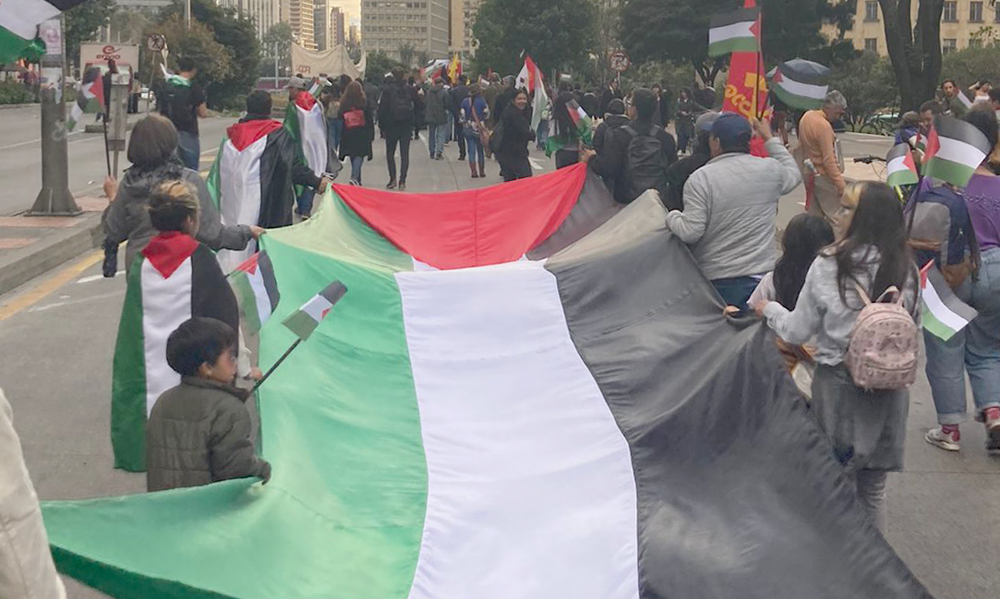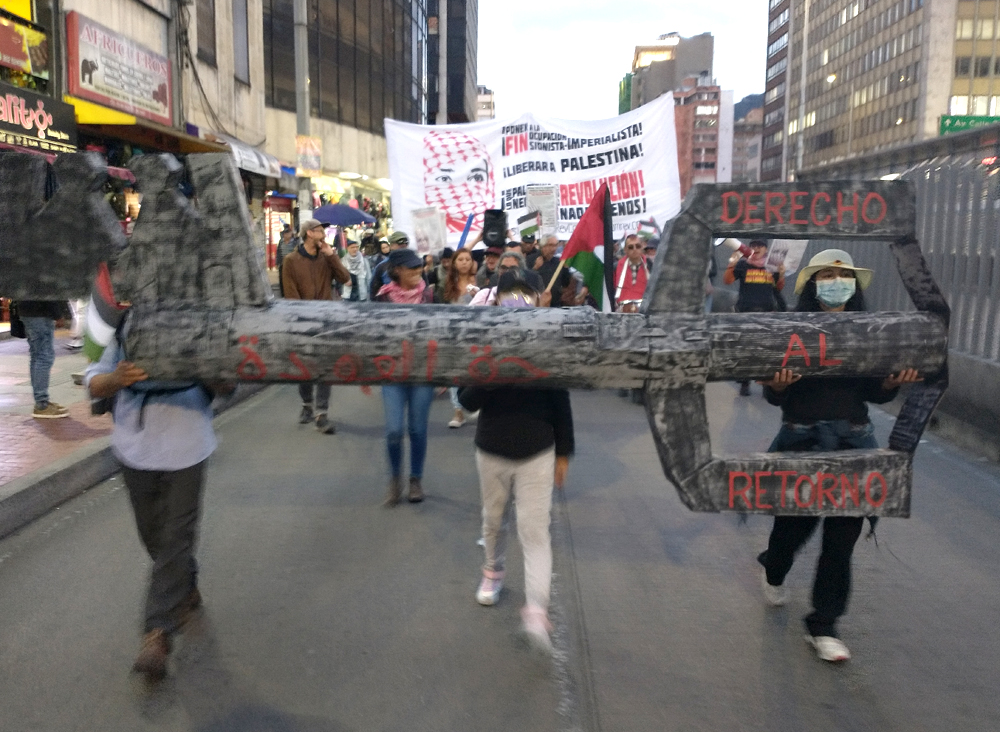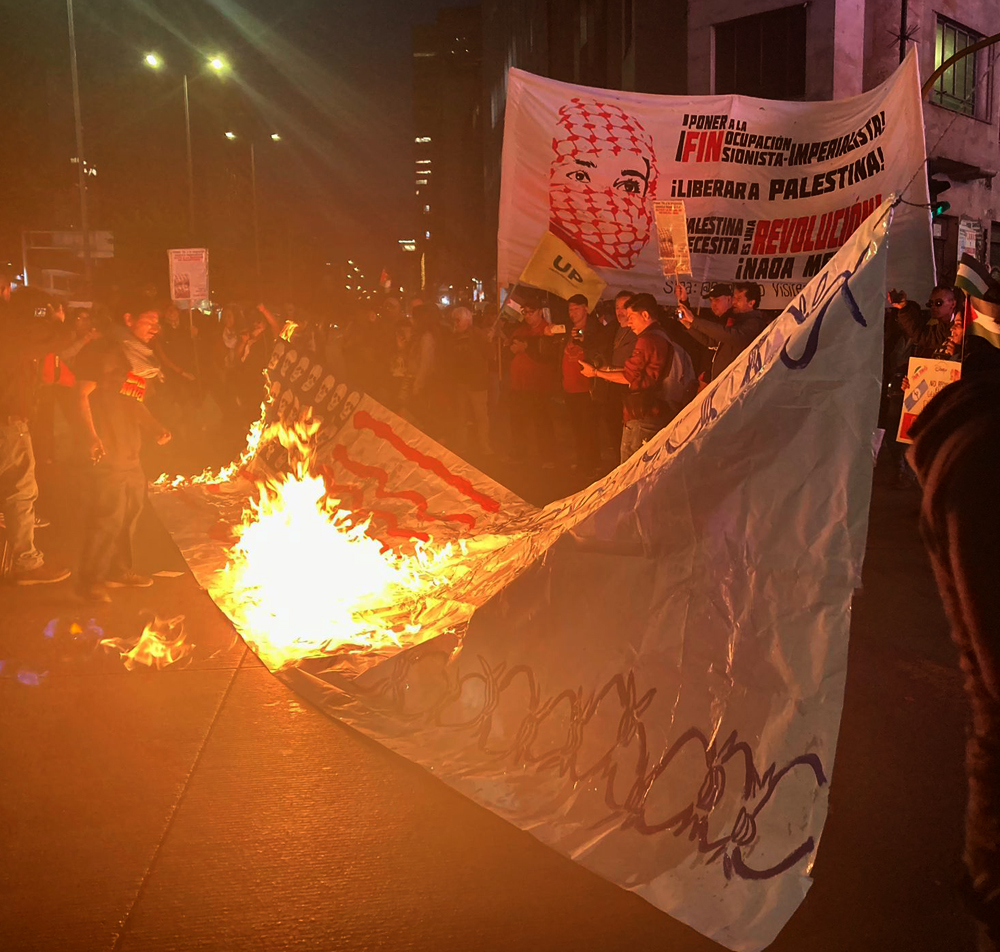Report from Bogotá
“People of Palestine, Colombia is with you!”

Through the streets of Bogotá, the declaration resounded. Its validation could be found in the enormous banners that called for a revolutionary end to occupation and apartheid. In the innumerable Palestinian flags held in the hands of everyone from the very young to the very old. In the stickers of radical solidarity that were slapped on street signs and store windows, visible in the march’s wake like seashells when a wave recedes. In the cheers of restaurant workers brought out to the sidewalks by the commotion. In the scores of trade unionists and socialists leading the way.
In English, it goes: “People of Palestine, Colombia is with you!” (“¡Pueblo palestino, Colombia está contigo!”)
And indeed, it was for Palestine that many hundreds were marching the nearly two miles from the Parque Nacional to the Plaza de Bolívar.
The long march teemed with passion and resolve, fervor and fury. Leftists sped around, handing out newspapers and stickers, or selling bandanas of red, black, white and green. Some bandanas showed a Palestinian woman firing a slingshot, while others declared, “¡Palestina para los palestinos!” and “¡Por una palestina laica, democratica y no racista!” (“For a secular, democratic, and non-racist Palestine!”)
Many people walked together with an enormous Palestinian flag, maybe fifty feet long and ten feet wide. Several of its bearers were young children. Elsewhere others carried an enormous papier-mâché key that took three people to heft. On it was painted, in part, “Derecho al retorno” (or “Right of return”).
People had stood their bicycles at crosswalks to impede oncoming traffic, and their bikes towed giant signs, such as one that read, “No dejes de hablar del genocidio en Palestina.” (“Don’t stop talking about the genocide in Palestine.”)
Banners representing Liga Internacional Socialista, Impulso Socialista, Congreso de los Pueblos, Comunes, Alternativa Revolucionaria Socialista, Brigadas Antimperialistas, Partido Socialista de los Trabajadores, and more leftist organizations were everywhere.

A car hooked up with rooftop speakers crawled along with the crowd, too, and orators alongside it blasted out messages of solidarity, and condemnations of complicity in Israel’s genocide by governments across the world, and most prominently the United States.
Chants buoyed the march along: “¡No es una guerra, es un genocidio!” (“It is not a war; it is a genocide!”), and “¡Desde el río hasta el mar, Palestina vencera!” (roughly, “From the river to the sea, Palestine will overcome!”, a cousin of the English chant, “From the river to the sea, Palestine will be free”).
More than halfway through the march, a cadre of activists suddenly stopped much of the crowd at a busy intersection. Several people unfurled and raised a massive banner displaying an image of linked Israeli and American flags (the latter complete with fifty skulls), intertwined in barbed wire. Bottles were pulled from backpacks, and the banner was doused in gasoline. In an instant, it went up in flames. In fervor and fury.
Two participants in the demonstration were Arturo Bravo and Valentina Perafán, self-described militantes of la Liga Internacional Socialista (International Socialist League) and its Colombian branch, Unidad Obrera y Socialista, or UNÍOS.
For Bravo, who’s familiar with demonstrations in Bogotá, the march and ardor of November 29 signified something in motion. This time, the action wasn’t limited to a minority migrant community whose homeland faced heightened oppression, or even to their perennial activist supporters. This time, it garnered vital support from the working class.
“The genocide in Palestine has acted as a catalyst, rekindling the mobilization of workers who typically respond to bureaucratic leadership,” Bravo told me the following day.
Previously, their mobilization was mainly driven by support for government reforms, lacking a broader willingness to take to the streets for just causes. The hope is that as they become less reliant on mobilizing solely for reforms, the union movement, in collaboration with a strengthened Left alternative, will prioritize the fight for substantial and genuine changes.
During the march, union representation and pride were everywhere you looked. The streets were filled with signs and banners—many of them attached to Palestinian flags—representing la Central Unitaria de Trabajadores, la Confederación General del Trabajo, la Confederación de Trabajadores de Colombia, la Asociación Distrital de Trabajadores y Trabajadoras de la Educación, la Federación Colombiana de Trabajadores de la Educación, and more.

Importantly, hundreds of Colombian workers were mobilizing not only in solidarity with Palestinian struggle, but doing so consciously and visibly as members of the working class.
Though the rekindling has opened new horizons for a radicalizing working class, Bravo nonetheless admits the limits of the current environment. The demonstration was organized by trade unions and political organizations coalesced by the reform-oriented Pacto Histórico por Colombia alliance, a coalition founded in early 2021 of center-left and progressive movements and political parties, and which includes Colombian president Gustavo Petro. Bravo said:
While the Colombian Left engages in ongoing debates, there is a shared consensus in denouncing Israel’s genocidal invasion. However, reformist elements still accept the progressive government’s decision to maintain relations, and they endorse this stance. Socialists, on the other hand, reject maintaining relations and demand that they be broken immediately. Unfortunately, it seems that the Colombian working class does not mobilize as immensely against the genocide as in other countries. That is why political organizations have a lot to do to expose the tepidity and lack of resolve among the reformists.
Despite the restraints of reformism, indications of more radical stances, of evolving consciousness, were unmistakable in the signs, chants, and militancy of many union members.
Some carried banners and signs that were resolutely intersectional, too. A woman representing FECODE, or la Federación Colombiana de Trabajadores de la Educación (Colombian Federation of Education Workers) carried a sign that began “En el Dia Internacional de la No violencia contra lus Mujeres…” and ended, “¡FECODE de pie con las mujeres palestinas!” (in total, “On the International Day for the Elimination of Violence Against Women… FECODE stands with Palestinian women!”).
For Bravo, the solidarity was both encouraging and very urgent:
It is very important that Colombian workers express their solidarity with Palestine. Such expressions of solidarity exert pressure on respective nations to take a stance against genocide. Each protest action is crucial in demonstrating that workers are committed to resisting imperialism and opposing genocidal practices.
For Bravo’s comrade Valentina Perafán, it’s not at all surprising that the Palestinian struggle resonates with the people of Colombia.
In UNÍOS, we understand that Colombia remains a semi-colony of U.S. imperialism,” she said. “Our regime is an ally of NATO, and on our land there are eight U.S. military bases. So we are too conditioned and dependent on the U.S. regime; we don’t have independence in almost anything. Also, because of economic interests, we have been living in an armed conflict for too many decades. We know about genocide and we have lived in war as our normality. Because of all of this, we can understand too well the Palestinian fight and empathize with their desire for freedom and sovereignty.
In this context of overlapping oppression, for Perafán the way forward follows international working-class solidarity:
We need to keep up the international mobilization to show that our class supports the Palestinian people. International support is essential. With it we can stop this genocide, and show that U.S. imperialism and the Israeli government are the real perpetrators of this genocide. Apart from international pressure, the Palestinian people must organize to recover all their lands with a socialist and feminist perspective because with anti-capitalist politics, they will be able to be free.
Within and beyond contributing to a militant trade-unionist and working-class movement, Bravo says the Colombian Left is pushing forward by many means:
Within la Unidad Obrera y Socialista (UNÍOS), we released a letter urging President Gustavo Petro to sever ties with Israel. Geopolitically isolating Israel is crucial, and as we persist in our street demonstrations, it is essential for Latin American governments to also cut their connections with Israel immediately. Our ongoing efforts should involve supporting protest actions, exposing and denouncing companies that fund Israel, and actively advocating for their boycott. We must stand in solidarity with our Palestinian comrades who join us in the streets, fighting alongside them. The unity of the working class transcends borders!
Of course, Bravo’s call to action includes anyone in the United States committed to supporting struggles against imperialism, colonialism, racism, and any phobia or form of injustice in Palestine, Colombia, and beyond. Bravo stressed:
Our American comrades have the opportunity to support our struggles, participate in our solidarity campaigns, and mobilize alongside us. It’s crucial to emphasize that the recent days of solidarity with Palestine have seen actions all over the world. If the imperialists globalize violence, we globalize resistance.

Anderson Bean assisted in translating the interview with Arturo Bravo, which has been edited for succinctness.
Categories
We want to hear what you think. Contact us at editors@tempestmag.org. And if you've enjoyed what you've read, please consider donating to support our work:
DonateJoel Sronce View All
Joel Sronce is a writer and activist from North Carolina, currently living in New York. He is a member of Tempest and the Greensboro Revolutionary Socialists.
